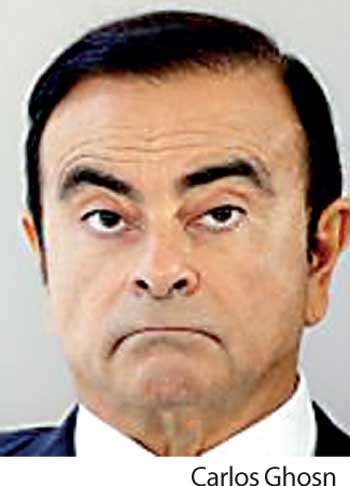05 Jan 2019 - {{hitsCtrl.values.hits}}
 (Tokyo) AFP: Former Nissan Chairman Carlos Ghosn is likely to appear in a Japanese court next Tuesday to hear the reasons for his detention, after his lawyers deployed a little-used article of the Constitution.
(Tokyo) AFP: Former Nissan Chairman Carlos Ghosn is likely to appear in a Japanese court next Tuesday to hear the reasons for his detention, after his lawyers deployed a little-used article of the Constitution.
The shock move was the latest in a series of unexpected twists in a case that has gripped Japan and the business world since the once-revered auto tycoon was arrested on his private jet at a Tokyo airport on November 19.
The Tokyo District Court said his hearing would start at 10:30 am (0130 GMT) in its court room, with Ghosn expected to appear.
“Mr. Ghosn today submitted a request for the disclosure of the reasons for his detention,” the court said yesterday.
Article 34 of Japan’s Constitution stipulates that “no person shall be arrested or detained without being at once informed of the charges against him or without the immediate privilege of counsel.”
“Nor shall he be detained without adequate cause; and upon demand of any person such cause must be immediately shown in open court in his presence and the presence of his counsel,” it says.
Ghosn is spending the beginning of 2019 in detention after the court on New Year’s Eve extended his detention through to January 11 on allegations of aggravated breach of trust.
He was re-arrested over these allegations on December 21, dashing his hopes of being home for Christmas.
Since his shock arrest on November 19, the case has shone a light on the Japanese legal system, which has come in for some criticism internationally.
Authorities are pursuing three separate lines of enquiry against the 64-year-old Franco-Lebanese-Brazilian executive, involving alleged financial wrongdoing during his tenure as Nissan chief.
They suspect he conspired with his right-hand man, US executive Greg Kelly, to hide away around half of his income (some five billion yen or US$44 million) over five fiscal years from 2010.
They also allege he under-reported his salary to the tune of four billion yen over the next three fiscal years -- apparently to avoid criticism that his pay was too high.
They are also investigating a complex third claim that alleges Ghosn sought to shift a personal investment loss onto Nissan’s books.
As part of that scheme, he is also accused of having used Nissan funds to repay a Saudi acquaintance who put up collateral money.
Prosecutors have pressed formal charges over the first allegation but not yet over the other accusations.
Ghosn denies the allegations but has not had the chance to defend himself in public.
The once jet-setting executive, who denies any wrongdoing, was initially held in a tiny single cell at the detention centre in the north of the Japanese capital but has now reportedly been moved to a more comfortable room.
He has complained about the cold and the rice-based menu, sources say, though he has told embassy visitors he is being well-treated although he has shed a lot of weight.
He has been stripped of his leadership roles at Nissan and Mitsubishi Motors but the third member of the auto alliance he helped forge, French automaker Renault, has kept him as nominal head while he fights the charges.
Ghosn’s detention has also laid bare tensions in the alliance he created, which together sells more cars than any of its rival groups.
Meanwhile, fresh claims against Ghosn appear almost daily in the Japanese media.
According to yesterday’s edition of the Nikkei business daily, Ghosn paid nearly US$50 million to businesses run by two Middle Eastern acquaintances from the “CEO reserve”, a pot of cash that the boss was able to use at his discretion.
16 Nov 2024 1 hours ago
16 Nov 2024 1 hours ago
16 Nov 2024 2 hours ago
16 Nov 2024 2 hours ago
16 Nov 2024 4 hours ago